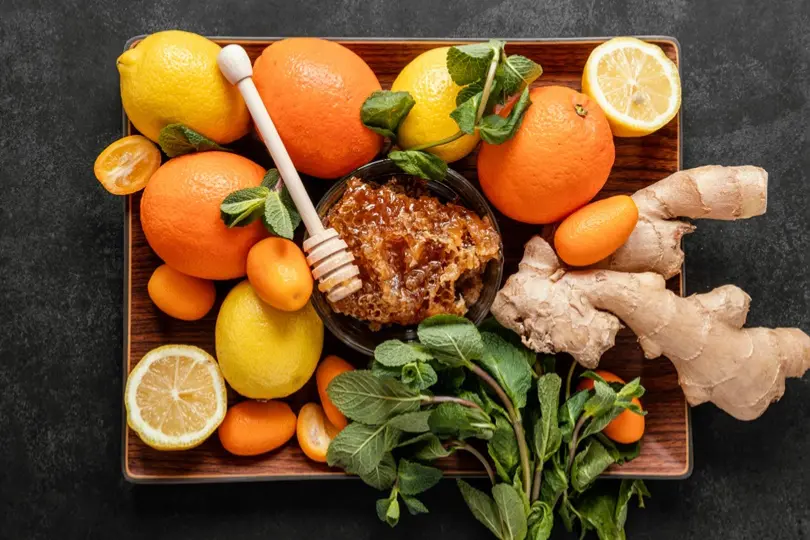
In the 21st century, consumers are paying closer attention to what they eat. The concern is not just about calories or taste anymore. It is also about long-term health and the way food connects to a growing list of lifestyle diseases. Over the next two decades, there is a double challenge: feeding a larger population while addressing the rising burden of obesity and related illnesses.
Medicine is facing its own crisis. Antibiotics have been prescribed casually for minor issues like sore throat or fever, and supplements are used for quick fixes. As a result, many antibiotics are losing their effectiveness, and treatments that worked only struggle to help.
A 2024 survey in India showed that only 15% of Indians are aware of antimicrobial resistance, and yet, many still consume antibiotics. After the pandemic, immunity has become a household word, and demand for immunity-boosting foods has surged.
This is the context for the current season. As winter sets in, the idea of immunity-building foods becomes more relevant. Not just to stay healthy indoors, but to be able to enjoy the season outdoors without being confined to bed.
In this blog, we explore some foods that can help achieve exactly that.
Immunity Boosting Foods
1. Amla
Below are some benefits of Amla:
- Rich in vitamin C: Vitamin C is an antioxidant that strengthens immunity, protects cells from viral and bacterial damage.
- Supports white blood cells (WBCs): Amla enhances the growth, movement, and function of WBCs.
- High in fiber: Fibers help in digestion and bowel movement
- Heart Health: Vitamin C and polyphenols lower bad cholesterol and raise good cholesterol, protecting the heart from damage.
- Iron source: helps fight iron deficiency.
- Cognitive boost: may sharpen memory and focus
- Blood sugar control: Amla increases insulin sensitivity and slows down sugar absorption due to its high fiber content.
- Eye health: Antioxidants protect eye cells from damage and promote healthy eye capillaries.
2. Turmeric
I remember my winters for one simple ritual. My mother would hand me a glass of turmeric milk after dinner, just before bed. Thanks to her, I rarely missed a day of school in those months, even if my report cards did not always look great.
Turmeric, known in science as Curcuma longa, offers many benefits when consumed in winter, such as:
- Antiviral and Antibacterial effect: Because of its antibacterial and antiviral properties, it helps to strengthen the body’s immune system.
- Skin Protection: Turmeric promotes skin health by reducing inflammation and fighting winter dryness, resulting in improved skin tone.
3. Oranges

- Rich in Antioxidants: Oranges are rich in antioxidants like flavonoids and carotenoids. This makes them beneficial not only for immunity but also for the skin and digestive system, both of which tend to weaken in winter.
- Rich in fiber: Fiber helps with digestion by adding bulk and absorbing water, which softens the stool and promotes regular, easier bowel movements.
- Presence of folate, choline, and citric acid: These components help support the immune system and brain function, and they also help prevent the formation of kidney stones.
4. Grapes
Grapes are easy to find in winter. They are not only enjoyable to eat but also good for immunity. Black or green, both kinds supply fiber along with key compounds that help the body fight pathogens. Among them are anthocyanins and resveratrol, both known for their protective role.
5. Strawberries
These bright red berries are more than a sweet fruit. They are packed with vitamin C, manganese, folate, potassium, and antioxidants: Together, they help the body fight stubborn illnesses, including conditions like diabetes that cannot be reversed.
The challenge is that people today often choose supplements instead of fruits. A report in 2024 valued the supplement market in India at 5.91 billion dollars. It is projected to grow by 10 to 15 percent over the next decade. Yet another estimate published by Financial Express suggests that close to 70 percent of supplements in India are fake. Which means that even regular consumption cannot guarantee any health benefit.
This gap is where online pharmacy like SayaCare have found an opportunity. Its founders, Dhruv and Shivangi, spotted the issue half a decade ago. They built a model where every medicine is tested before being sold. The company sources drugs from manufacturers and then sends them to NABL-approved labs for quality checks. This ensures that only products meeting standard requirements reach the customer. Today, SayaCare serves more than one lakh people who buy their medicines from the platform regularly.
Conclusion
Winter in North India is the season when the temperature not only changes in the environment but also affects the body. The whole body needs extra care. Foods like amla, turmeric, oranges, grapes, and strawberries provide essential nutrients that help the body stay strong by boosting immunity.
Additionally, they support heart health, digestion, skin, and even cognitive function. But because of busy schedules, people are now shifting from eating to taking supplements. Because of the growing demand, not every supplement in the market is real, and that is where online pharmacies like SayaCare make a difference by ensuring quality and safety for every product sold.
Photo Credit:
Photo 1, Credit to Freepik || Photo 2, Credit to Freepik (CC0 1.0)




